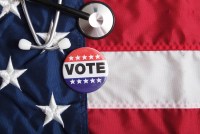Latest KFF Health News Stories
‘Not Accountable to Anyone’: As Insurers Issue Denials, Some Patients Run Out of Options
Health insurers issue millions of prior authorization denials every year, leaving many patients stuck in a convoluted appeals process, with little hope of meaningful policy change ahead. For doctors, these denials are frustrating and time-consuming. For patients, they can be devastating.
Feds Chop Enforcement Staff and Halt Rules Meant To Curb Black Lung in Coal Miners
The Trump administration has paused implementation of a rule limiting miners’ exposure to airborne silica dust days after a federal court agreed to put it on hold to hear an industry challenge. The protections are meant to head off a surge in cases of black lung disease. Meanwhile, any enforcement of new standards might be meager due to workforce cuts.
Flawed Federal Programs Maroon Rural Americans in Telehealth Limbo
Get our weekly newsletter, The Week in Brief, featuring a roundup of our original coverage, Fridays at 2 p.m. ET.
Flawed Federal Programs Maroon Rural Americans in Telehealth Blackouts
Taxpayers — through federal infrastructure programs — have paid billions of dollars to internet companies to hook up rural Americans. Some communities have nothing to show for it, leaving medically vulnerable rural patients disconnected and without access to telehealth.
Tax Time Triggers Fraud Alarms for Some Obamacare Enrollees
Consumers who were enrolled fraudulently in Affordable Care Act coverage could receive unexpected tax bills — the first and possibly only clue they were a victim of fraud. Getting help may become difficult as federal workers are laid off and funding for assistance programs is cut.
Republicans Once Wanted Government out of Health Care. Trump Voters See It Differently.
Frustrated by high health care prices, many who backed President Donald Trump support strong government actions to protect patients. It’s unclear whether GOP leaders will listen.
Childhood Vaccination Rates, a Rare Health Bright Spot in Struggling States, Are Slipping
Mississippi, Tennessee, and West Virginia — states with some of the worst health outcomes — also have some of the highest childhood vaccination rates. But doctors and health officials worry a rising tide of vaccine skepticism is causing those public health bright spots to dim.
Defensores, médicos, investigadores, y funcionarios de salud pública temen que estos logros en algunos estados como Mississippi y Tennessee estén desapareciendo.
Syringe Exchange Fears Hobble Fight Against West Virginia HIV Outbreak
Health workers and researchers say an HIV outbreak in West Virginia that three years ago was called “the most concerning” in the U.S. continues to spread after state and local officials restricted syringe service programs.
Who Gets Obesity Drugs Covered by Insurance? In North Carolina, It Helps If You’re on Medicaid
GLP-1 agonist medications such as Ozempic accounted for 10% of the North Carolina state employee health plan’s prescription drug spending, so the state is no longer covering them for weight loss alone. Still, it did decide to cover them for Medicaid patients’ weight loss. A look inside the state’s coverage calculus.
¿Podrían los nuevos medicamentos para bajar de peso estar disponibles para todos?
Los medicamentos agonistas GLP-1, conocidos por los nombres comerciales Ozempic, Trulicity y Wegovy, han demostrado ser efectivos para la pérdida de peso y para el manejo de la diabetes tipo 2.
Mothering Over Meds: Docs Say Common Treatment for Opioid-Exposed Babies Isn’t Necessary
Amid what has been called the fourth wave of the opioid epidemic, doctors and researchers are walking back medication-heavy methods of treating babies born experiencing opioid withdrawal symptoms, replacing the regimen with the simplest care: parenting.
Trump, Harris Spar Over Abortion Rights and Obamacare in Their First Face-Off
The generally combative face-off was marked by a series of false and sometimes bizarre statements from former President Donald Trump.
Social Media Bans Could Deny Teenagers Mental Health Help
Congress and state legislatures are considering age bans and other limits for Instagram and TikTok out of concern that they harm kids’ mental health. But some researchers and pediatricians question whether there’s enough data to support that conclusion.
West Virginia City Once Battered by Opioid Overdoses Confronts ‘Fourth Wave’
Years of struggle prepared residents in Cabell County, West Virginia, to confront the latest wave of the opioid epidemic as mixtures of fentanyl and other drugs claim lives nationwide.
Movimientos en contra de las vacunas perjudican a los niños más vulnerables
La desinformación, junto con un movimiento por el derecho de los padres que aleja la toma de decisiones de la salud pública, ha contribuido a las tasas de vacunación infantil más bajas en una década.
How the Anti-Vaccine Movement Pits Parental Rights Against Public Health
Framed in the rhetoric of choice, Tennessee’s new law governing childhood vaccinations is among more than a dozen recently passed or pending nationwide that set parental freedom against community and children’s health.
Whistleblower Accuses Aledade, Largest US Independent Primary Care Network, of Medicare Fraud
A recently unsealed lawsuit alleges Aledade Inc. developed billing software that boosted revenues by making patients appear sicker than they were.
Statistical Models vs. Front-Line Workers: Who Knows Best How to Spend Opioid Settlement Cash?
A mathematical model designed to direct spending of opioid settlement funds is at the center of a debate over whether to invest in technology to guide long-term decisions or focus on the immediate needs of people in addiction.
America Worries About Health Costs — And Voters Want to Hear From Biden and Republicans
The presidential election is likely to turn on the simple question of whether Americans want Donald Trump back in the White House. But health care tops the list of household financial worries for adults from both parties.























